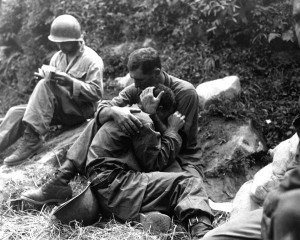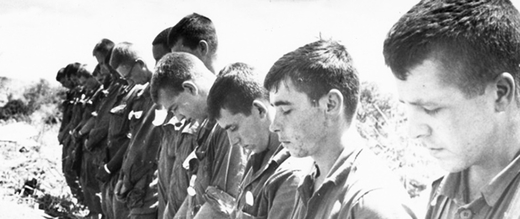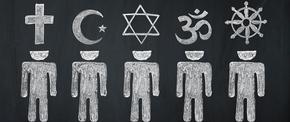The views expressed in our content reflect individual perspectives and do not represent the authoritative views of the Baha'i Faith.
We humans have always prayed.
We pray when we suffer. We pray when we’re in distress. We pray for help in times of danger. We pray for assistance. We pray for the ones we love. We pray when death comes. We even pray, in gratitude, when things go well in life. Prayer is universal. Every culture and every Faith has its prayers:
…in all Dispensations the law of prayer hath constituted a fundamental element of the Revelation of all the Prophets of God — a law the form and the manner of which hath been adapted to the varying requirements of every age. – Baha’u’llah, The Book of Certitude, p. 38.

Some people pray silently, while others pray loudly. Some pray by chanting, some by singing, some with dancing. Some people pray while sitting, some while kneeling, some prostrate themselves, some pray in a church or a temple or a mosque or a shrine, some walk in the forest and pray in the natural cathedral of the trees. Some people pray many times a day, some once a week, some only in a crisis.
But in my experience, almost everyone prays, sooner or later.
I learned that fact in war. My father, a Marine in WWII, once told me during my agnostic youth that “there are no atheists in foxholes.” I’d heard that one before, and didn’t believe it. In fact, I rejected it outright. I reasoned that if you didn’t accept the existence of a Supreme Being, why would you ever seek help from that non-existent God?
But then I went to Vietnam.
I quickly found out that most people seek divine intervention when they face an extreme threat. That instinctive distress call for help from a higher power seems woven into our beings.
Researchers have even asked combat veterans about their beliefs by looking into the question, “Are there atheists in foxholes?” Brian Wansink, a behavioral economist from Cornell, surveyed nearly a thousand World War II American infantrymen, and found that the soldiers’ reliance on prayer rose from 32% to 74% as their battles intensified.
My very first “intensified” wartime prayer experience involved a fellow soldier named Eddie deJesus. Eddie, a nineteen-year-old Puerto Rican guy from New York City, had already lived a hard life. His parents both died young, and he’d been raised in a series of foster homes, some of them pretty rough. Eddie got in trouble early and often, and came to know the ins and outs of the juvenile courts and detention system pretty well by the time he turned fifteen. As soon as he could drive he discovered car theft, and it became a lucrative profession for him. At eighteen, arrested yet again, he learned he wouldn’t be going back to “juvie,” as he called it—this time, as an adult, he faced a different fate. The judge offered him prison or the military. He and I arrived in Vietnam on the same day.
Despite his checkered past Eddie had a good mind, and we became buddies. He and I had great conversations about our beliefs. He had rejected the Catholic God he grew up with, and I had recently become a Baha’i, so we often compared notes. Eddie scoffed at the notion of any Creator; and I tried to explain that the God Baha’is believe in couldn’t be conceived of, depicted or understood.
“I don’t get it. How do you even think about a God like that?” Eddie asked once.
“It’s not literal. I just try to understand God’s qualities,” I told him. “Love, kindness, mercy, beauty, enlightenment, grace. You know, the character traits of Christ, Buddha, Baha’u’llah—how they lived their lives, for others.”
“Hmm,” was all he said.
Still an inarticulate teenager, I couldn’t really express what I felt. I wish I would’ve known about this quote from the Baha’i teachings at the time:
Know thou, verily, it is becoming of a weak one to supplicate to the Strong One, and it behoveth a seeker of bounty to beseech the Glorious Bountiful One. When one supplicates to his Lord, turns unto Him and seeks Bounty from His Ocean, this supplication is by itself a light to his heart, an illumination to his sight, a life to his soul and an exaltation for his being.
Therefore, during thy supplication to God… consider how thine heart is cheered up, thy soul delighted by the spirit of the Love of God, and thy mind becomes attracted to the Kingdom of God! By these attractions, one’s ability and capacity increase. When the vessel is widened the water increaseth, and when the thirst grows the bounty of the cloud becomes agreeable to the taste of man. This is the mystery of supplication… – Abdu’l-Baha, Star of the West, Volume 3, p. 303.
Eddie and I had our discussions pretty regularly—he liked to talk about spiritual ideas. But then one night, after just a few weeks in country, we got hit. Rockets came flying in, big fearsome weapons that exploded on impact and scattered deadly shrapnel everywhere. Men died, some were wounded, many screamed for help. In the simple open trenches we dug for foxholes, everyone prayed intensely, imploring God to let them live one more day. As the rockets exploded around us, you could smell the fear and feel the intense pleas to a higher power. As the smoke from the explosions rose into the air, you could hear the mumbled or shouted prayers rising up from our trenches, too.
I saw Eddie the next morning. His eyes had that combat-haunted, faraway focus we called the thousand-yard stare. I probably did, too. We had both looked death in the face.
“Yeah, okay, I prayed,” he said, sheepish. “I admit it. Just like every other sorry sucker last night, I prayed my brains out. I ain’t proud of it, though.”
We laughed together. We both needed that kind of release after coming so close to dying.
“Hey,” I told him, “it worked. You’re still here.”

















Comments
Sign in or create an account
Continue with Facebookor